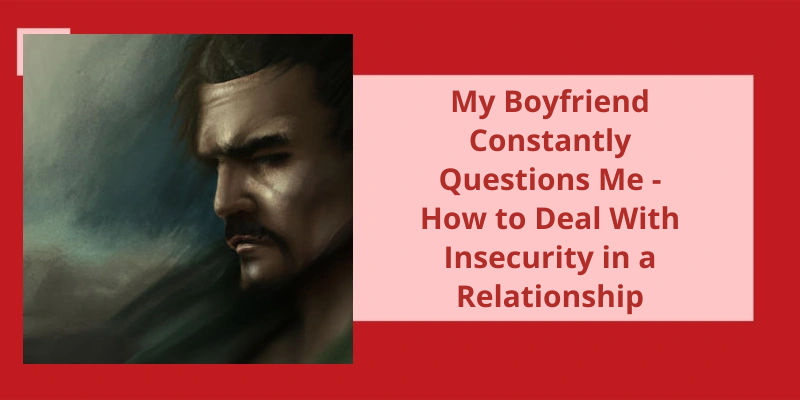Dating can be a challenging and often unpredictable undertaking. It's an adventure that high prospects of excitement and love but also heartbreak and disappointment. But what happens when the person you're interested in appears to be cold and unemotional? Dating a "cold-hearted" person takes a unique approach. It can feel like trying to warm up a block of ice, but it's not impossible. Unlike people who wear their hearts on their sleeves, cold-hearted individuals often have an unbreakable exterior that can be intimidating. However, with some understanding, patience, and effort, it's possible to begin the process of thawing the ice. This article takes a closer look at some tips to navigate dating a cold-hearted person and how to show them that you're open to creating a connection.
How Do You Deal With a Cold-Hearted Partner?
It can be difficult to be in a relationship with a cold-hearted partner, as it may feel like they’re shutting you out and not allowing you to get close to them. However, it’s important to recognize that this behavior may simply be a coping mechanism for them to deal with their own problems in a way that doesn’t burden others. If this is the case, it’s important to respect their boundaries and let them know that you’re there for them if they ever need to talk.
One way to approach a cold-hearted partner is to express your concern for them without being pushy or demanding. Let them know that you’re there to listen if they ever want to talk, but also acknowledge that they may prefer to deal with their problems on their own. This can help to build trust and create a safe space for them to open up if and when they feel ready.
This may mean finding other sources of support and fulfillment outside of the relationship, or setting boundaries to protect your own emotional well-being. It’s okay to prioritize your own needs and boundaries, even in a relationship.
If your partners emotional distance is causing significant problems in the relationship, it may be helpful to seek the support of a therapist or relationship coach. They can help you navigate the challenges of being in a relationship with a cold-hearted partner, and work with both of you to improve communication and emotional intimacy.
With time and effort, it may be possible to create a more loving and supportive relationship, but it’s important to recognize that this process may be slow and challenging.
As much as we try to see the good in people, the truth is that not everyone has our best interests at heart. Some people are simply cold-hearted and lack empathy, making it difficult to forge meaningful relationships with them. In this article, we explore 23 traits that characterize such individuals, from their detachment and self-centeredness to their tendency to act superior and unreliable.
What Are the Qualities of a Cold-Hearted Person?
A cold-hearted person is someone who lacks empathy, emotional warmth, and compassion towards others. Such individuals tend to be distant, detached, and aloof, keeping people at arms length. They appear aloof and superior, often acting as if they’re above others. They prioritize their own needs and desires over the needs and desires of others, often acting selfishly.
Communication with a cold-hearted person is often one-sided and monotonous. They seem uninterested in listening to others and genuinely understanding their concerns. They may come across as indifferent or apathetic when others share their emotions, and this behavior can be discouraging, frustrating, and hurtful to those on the receiving end.
Another trait of a cold-hearted person is inconsistency and unpredictability. Others may find it challenging to rely on or trust them since they’ve a tendency to be untrustworthy and unreliable. They may abandon commitments abruptly and without explanation, leaving those who depend on them feeling abandoned and vulnerable. Indifferent to the consequences of their actions, they may cause harm to those around them with little regard for their emotional state.
They tend to be distant and detached, making it difficult to empathize with others. They often treat others with disdain, making it hard for people to establish meaningful relationships with them. They tend to be self-centered, insensitive, and untrustworthy, causing much pain and frustration to those already close to them or attempting to gain intimacy.
What Are the Causes of a Person Becoming Cold-Hearted? Are They Born That Way, or Do Life Experiences Make Them That Way?
This topic explores whether people become cold-hearted due to nature (born that way) or nurture (life experiences).
However, regardless of the reason, it can be frustrating and confusing to be on the receiving end of mixed signals. In this article, we will explore some of the common reasons why people turn cold in a relationship, and provide tips for how to navigate this challenging situation.
Why Do People Turn Cold in a Relationship?
Another reason for someone to turn cold in a relationship is due to past traumas or emotional baggage. Sometimes, people have gone through hurtful experiences in their past relationships, which makes them cautious about getting close to someone new. They may withdraw when they feel like things are getting too intense, even if they genuinely care for their partner. In such situations, it’s essential to communicate and create a safe space for the person to open up about their fears and insecurities.
Perhaps they feel unappreciated, undervalued, or taken for granted. They may have communicated their concerns to their partner, but if nothing changes, they may become distant and detached. It’s essential to address these issues early on and work towards resolving them together. Ignoring them will only lead to resentment and frustration.
Sometimes, people turn cold as a way of coping with loss or grief. This could be because of a personal tragedy or a significant life change, such as a job loss or a family members death. When a person is dealing with a difficult situation, they may not have the emotional capacity to invest in their relationship. In such cases, providing unconditional support, patience, and understanding is crucial.
Another reason for someone to turn cold is because of their personality traits or communication style. Some people are naturally guarded and take longer to open up, while others struggle with expressing their emotions. In such cases, it’s important to create an environment that encourages open and honest communication. It might take some time, but with patience and consistent effort, the person can start to feel comfortable enough to share their feelings.
This could be because they’ve changed their mind about their feelings or because they’ve found someone else. In such cases, it’s important to respect their decisions and move on. As difficult as it may be, it’s important to focus on finding someone who shares the same values and desires for a committed relationship.
Being cold-hearted isn’t always a negative trait, sometimes it can be necessary to protect yourself and make difficult decisions. In this article, we will discuss some actionable steps you can take to become more cold-hearted and deal with situations that require it. Read on to find out how you can implement these steps in your life.
What Are Three Ways to Be Cold-Hearted?
Cold-heartedness is often associated with a lack of empathy, detachment, and a willingness to prioritize personal gain over others. If youre looking to become more cold-hearted, there are several strategies you can employ to help you achieve this goal. One way is to make sure you stick to your decisions, no matter what. This means being resolute in your choices and avoiding second-guessing yourself. By doing so, youll be less susceptible to the emotional appeals of others and more focused on achieving your objectives.
This means limiting your interactions with others to the bare minimum and avoiding unnecessary communication whenever possible. Doing so will help you to maintain emotional distance and prevent others from getting too close or becoming too familiar with you. Of course, it’s important to strike a balance here. You don’t want to isolate yourself completely, but you also don’t want to become overly attached or emotionally dependent on anyone.
Being direct is also key to becoming more cold-hearted. This means speaking plainly and clearly without any sugar-coating or ambiguous language. By doing so, youll be more effective in getting your point across and less likely to be misunderstood or manipulated by others. Additionally, it’s important to avoid expressing your thoughts or feelings too openly. This doesn’t mean you should be dishonest or deceitful, but rather that you should be more guarded about what you say and how you say it.
Another way to become more cold-hearted is to use logic over emotions. This means being rational and analytical in your decision-making rather than allowing your emotions to cloud your judgment. By focusing on facts and evidence rather than feelings, youll be better equipped to make objective and rational decisions that are in your best interest. However, it’s important to note that this doesn’t mean completely disregarding your emotions altogether. Emotions can be useful and informative, but they should be weighed carefully against other factors.
Finally, turning your anger into fuel can help you to become more cold-hearted. This means channeling your negative emotions and frustrations into productive and constructive outlets. By doing so, youll be able to use these emotions to drive you forward and motivate you to achieve your goals. Additionally, having a clear sense of your own value and worth can help you to become more confident and self-assured, which can be important in developing a cold-hearted mindset.
By following these actionable strategies, you can develop the mental fortitude and emotional detachment necessary to succeed in todays competitive world. Just remember to strike a balance between being cold-hearted and maintaining healthy relationships with others. being cold-hearted shouldnt be about hurting others, but rather about making yourself stronger and more resilient.
Conclusion
It's important to remember that underneath the exterior of their icy demeanor, there may be a person who’s deeply hurting and in need of comfort and understanding. Learning how to communicate and connect with a cold-hearted partner requires patience, empathy, and a willingness to listen. While it may be challenging at times, by showing your partner that you're open and available to talk whenever they're ready, you can help create a safe and supportive environment where they can start to let down their guard and open up to you.






